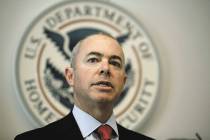EDITORIAL: Alternative punishment
The loss of driving privileges can create numerous hardships — particularly when it comes to employment — for those lacking the means to Uber around town or pay for a cab. If you can’t get to work, you’ll likely soon be out of a job.
But does that mean the poor should be exempt from obeying certain laws or paying court judgments?
The Associated Press reported last week that the National Center for Law and Economic Justice has filed a lawsuit arguing that a Tennessee law unfairly targets low-income residents by revoking the driver’s licenses of people with unpaid court fines.
The lawsuit features two Nashville plaintiffs, including a disabled homeless man who was denied a license because he can’t afford to pay $290 in outstanding fines, the suit alleges.
“These are not people who are running out on their debts,” an attorney with the center told the wire service. “It’s people who can’t afford to pay, and it’s not their fault they can’t.”
According to the lawsuit, only 7 percent of the people who lost their driver’s licenses since the law went into effect in 2012 have been able to get them back.
Similar lawsuits are pending in Virginia and California, the AP reports.
Of course any system that imposes monetary penalties for legal violations will, by it’s very nature, be harder on those who struggle to get by. But as long as such laws are equally applied and aren’t used in an arbitrary and capricious manner to harass or intimidate the poor — or to simply pad municipal budgets — it’s hard to see how they run afoul of the Constitution.
The lawsuit, however, highlights a relevant question: What is the point of levying fines on those who simply can’t afford to pay? A far better approach would be to consider more liberal use of alternative punishments — community service, perhaps — to allow indigent offenders to wipe the slate clean without being smothered by ever-increasing financial judgments that will never be honored.
Low-income wrongdoers who have broken the law shouldn’t be absolved of accountability simply because of their financial status. But judges and the courts should be more inclined to eschew fees and fines in favor of more innovative strategies designed to resolve cases and make society whole — while also ensuring defendants have the opportunity to move forward.























